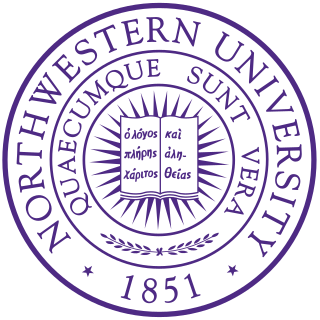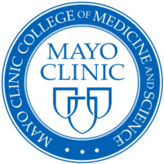Related Research Articles

The Mayo Clinic Hospital – Rochester is a 2,059-bed teaching hospital located in Rochester, Minnesota. It comprises the Saint Marys Campus with its Mayo Eugenio Litta Children's Hospital, as well as its Methodist Campus, forming an integral part of the Mayo Clinic academic medical center. Mayo Clinic Hospital – Rochester is ranked first on the 2019–20 U.S. News & World Report Best Hospitals Honor Roll.

The Feinberg School of Medicine is the medical school of Northwestern University and is located in the Streeterville neighborhood of Chicago, Illinois. Founded in 1859, Feinberg offers a full-time Doctor of Medicine degree program, multiple dual degree programs, graduate medical education, and continuing medical education.

The Mayo Clinic College of Medicine and Science is a private graduate-only research university based in Rochester, Minnesota, United States. It trains physicians, scientists, and allied health professionals. The college is part of the Mayo Clinic academic medical center and is accredited by the Higher Learning Commission (HLC). The college consists of five schools that offer Doctor of Medicine, Doctor of Philosophy, and other degrees, as well as medical residencies, fellowships, and continuing medical education.
Adolescent medicine, also known as adolescent and young adult medicine, is a medical subspecialty that focuses on care of patients who are in the adolescent period of development. This period begins at puberty and lasts until growth has stopped, at which time adulthood begins. Typically, patients in this age range will be in the last years of middle school up until college graduation. In developed nations, the psychosocial period of adolescence is extended both by an earlier start, as the onset of puberty begins earlier, and a later end, as patients require more years of education or training before they reach economic independence from their parents.

Victor Montori is a professor of medicine at the Mayo Clinic in Rochester, Minnesota, United States. He has made contributions to the fields of evidence-based medicine, patient-centered care, and diabetes research.

Gunnar B. Stickler was a pediatrician who made substantial contributions to the field of pediatrics. He was the first scientist to describe a hereditary condition now known as Stickler syndrome.
Medical centers in the United States are conglomerations of health care facilities including hospitals and research facilities that also either include or are closely affiliated with a medical school.

Christopher G. Chute is a Bloomberg Distinguished Professor at Johns Hopkins University, physician-scientist and biomedical informatician known for biomedical terminologies and health information technology (IT) standards. He chairs the World Health Organization Revision Steering Group for the revision of the International Classification of Diseases (ICD-11).

Lauren V. Wood is an American allergist, immunologist, and staff physician at the National Cancer Institute (NCI) at the National Institutes of Health (NIH) in Bethesda, Maryland, where she has served as a principal investigator. She is known for conducting studies of vaccines for cancer, Human papillomavirus (HPV), Hepatitis C, and HIV especially for use with children, teens and young adults. She holds the rank of captain in the U.S. Public Health Service (PHS).
David A. Brent is an American psychiatrist with expertise in child and adolescent psychiatry and suicidology. He is Professor of Psychiatry, Pediatrics & Epidemiology and Endowed Chair in Suicide Studies at the University of Pittsburgh School of Medicine, as well as the academic chief of Child and Adolescent Psychiatry at Western Psychiatric Institute and Clinic.
Renee Rosalind Jenkins is an American pediatrician known for her work in adolescent medicine. She is the first African-American president of the American Academy of Pediatrics and the Society of Adolescent Medicine.

Holger Lode is a German specialist for pediatrics. He is Professor and Chair of the Department of General Pediatrics and Pediatric Hematology and Oncology at the University Medicine Greifswald. He is also the director of the Center of Pediatrics and Adolescent Medicine in Greifswald. Lode is well known for his clinical and scientific work on immunotherapy of neuroblastoma.

Mark W. Kline is an American pediatrician and infectious diseases specialist who currently serves as the Physician-in-Chief, Senior Vice President and Chief Medical Officer at Children's Hospital New Orleans and Professor of Pediatrics at the Tulane University School of Medicine and LSU Health New Orleans. Kline is known for his life-long work in building programs for children with HIV/AIDS all over the world.
Marie Clare McCormick is an American pediatrician and Sumner and Esther Feldberg Professor of Maternal and Child Health in the Department of Social and Behavioral Sciences at Harvard T.H. Chan School of Public Health in Boston, Massachusetts. She also holds an appointment as professor of pediatrics in the Harvard Medical School. In addition, she is the senior associate for academic affairs in the department of neonatology at the Beth Israel Deaconess Medical Center. Her research primarily focused on epidemiology and health services, particularly in relation to infant mortality and the outcomes of very low birthweight (VLBW) and otherwise high-risk neonates.

The Mayo Clinic Alix School of Medicine (MCASOM), formerly known as Mayo Medical School (MMS), is a research-oriented medical school based in Rochester, Minnesota, with additional campuses in Arizona and Florida. MCASOM is a school within the Mayo Clinic College of Medicine and Science (MCCMS), the education division of the Mayo Clinic. It grants the Doctor of Medicine (M.D.) degree, accredited by the Higher Learning Commission (HLC) and the Liaison Committee on Medical Education (LCME). In November 2018, the school was renamed in honor of a $200 million donation from businessman Jay Alix.
Jasmine R. Marcelin is a Caribbean-American infectious disease physician and an Assistant Professor in the Department of Internal Medicine at the University of Nebraska Medical Center (UNMC). Marcelin is also the Associate Medical Director of the Antimicrobial Stewardship Program and as well as the Co-Director of Digital Innovation and Social Media Strategy at UNMC.
Ligia Peralta is a Dominican-born doctor of pediatrics and adolescent medicine in Maryland. Her research focuses on HIV and the transmission of HIV in adolescents, specifically those from under-served communities.
Scott Andrew Rivkees is an American physician-scientist and pediatric endocrinologist, who served as State Surgeon General and Secretary of Health of Florida from June 2019 to September 2021. The majority of Rivkees' tenure coincided with the COVID-19 pandemic.
Catherine Mason Gordon is an American pediatrician who is clinical director of the Eunice Kennedy Shriver National Institute of Child Health and Human Development, National Institutes of Health.

Véronique L. Roger is a French cardiologist and epidemiologist. She is a senior investigator and chief of the laboratory of heart disease phenomics at the National Heart, Lung, and Blood Institute.
References
- 1 2 Mayo Clinic doctor profile: Jacobson, Robert M. M.D.. Mayo Clinic. Accessed April 14, 2013.
- ↑ Mayo Clinic Researcher Profile. Accessed December 20, 2016.
- ↑ PubMed listing of journal articles. Accessed December 20, 2016.